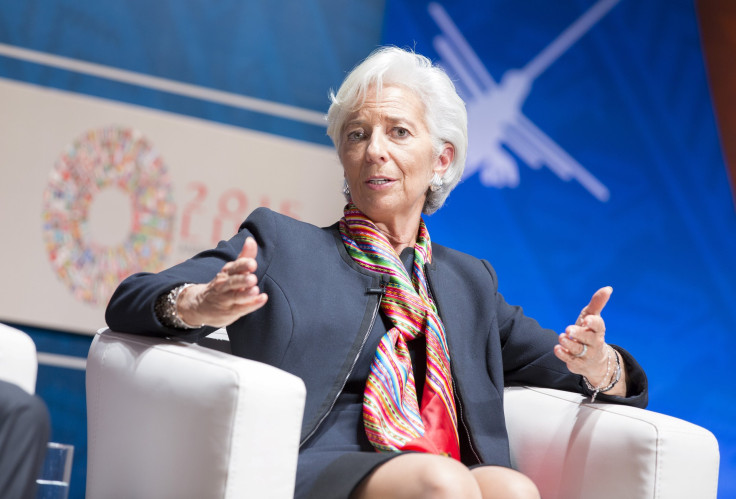World Markets In 'New Mediocre' Era: IMF's Lagarde

LIMA, Peru (Reuters) -- Central banks have little room for error in a low-growth world in which over-leveraged and commodity-dependent emerging economies and a slowing China are major risks, top international financiers told the International Monetary Fund's meeting.
Despite $7 trillion in quantitative easing from banks in industrial nations since the global financial crisis, the world is stuck in a "new mediocre" growth pattern, IMF chief Christine Lagarde said on Thursday.
The IMF meeting comes as the Bank of Japan looks poised to extend its money printing program, so-called quantitative easing, as it stares down the barrel of a fifth year of recession.
The European Central Bank is also expected to extend quantitative easing, while the two major central banks closest to raising rates, the U.S. Federal Reserve and the Bank of England, are holding fire.
"It is not the kind of economy in which you can make a mistake," Bank of England Governor Mark Carney told the meeting.
For both the Fed and the Bank of England, inflation targets are far out of reach, although both insist they are ready to hike rates, possibly by the end of this year.
Markets however are pricing in hikes only next year for both.
The IMF has urged the Fed, Japan and Europe to wait for more signs of recovery before tightening and Lagarde on Thursday repeated her plea to Fed Chair Janet Yellen to stay her hand.
TURMOIL IN EMERGING MARKETS
Many emerging markets, once the world's fastest growing economies that had been expected to shape a new world economic order, are now in turmoil. Brazil, Latin America's largest economy, is facing a leadership crisis and is in recession. Russia is engaged in conflicts in Ukraine and Syria and has been hammered by low oil prices.
China's growth is slowing, although Lagarde was optimistic that the slowdown was manageable.
While the world's central banks' money printing programs have staunched losses in the financial sector, they have failed to reach their goal of boosting global credit.
With widening current account balances and excessive lending to local companies, the IMF estimates that emerging market companies are overleveraged by the equivalent of 15 percent of their economic output, raising the risk of a sudden collapse in credit and of banking crises.
The IMF cut its estimate for growth in emerging economies for the fifth successive year this week, citing the collapse of the "commodities supercycle" in which buoyant demand for raw materials had boosted prices.
From a record of $145 per barrel in 2008, oil prices have fallen to around $50, holing the budgets of major producers like Russia and Angola, among emerging economies.
Brazilian Finance Minister Joaquim Levy called on Thursday for cash-rich pension funds and institutions to invest in infrastructure projects, although few seem willing to do so as returns are uncertain in a low-demand world with the risk of financial contagion.
"There are plenty of savings in the world," he told the IMF meeting.
Lagarde repeated the Fund's mantra for structural economic reforms and for those countries with the room to raise spending to do so. However, that appears politically impossible in the euro zone, while in the United States, Congress is deeply divided.
Former U.S. Treasury Secretary Larry Summers, who has long warned of the risks of "secular stagnation", or permanent damage to growth, chided policymakers for relying on the same old tools to boost demand.
"Traditional approaches of focusing on sound government finance, increased supply potential and the avoidance of inflation court disaster," he wrote in editorials published to coincide with the IMF conference.
"Moreover, the world’s principal tool for dealing with contraction — monetary policy — is largely played out. It follows that policies aimed at lifting global demand are imperative."
(Reporting by Paul Carrel, Alonso de Soto, Krista Hughes, Lidia Kelly; Writing by David Chance; Editing by Chizu Nomiyama and Meredith Mazzilli)
© Copyright Thomson Reuters 2024. All rights reserved.




















